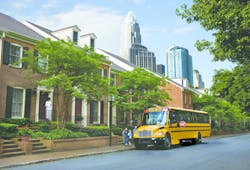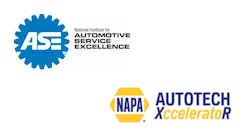Thomas Built Buses – a leading bus manufacturer in North America – has finalized the installation of new equipment and infrastructure as part of its recently announced expansion to one of its two bus building plants in High Point, N.C.
This $12M expansion at its 275,000-sq-ft C2 manufacturing plant was necessary to meet increasing customer demand for the “industry leading” Saf-T-Liner C2 conventional-style school bus, says Caley Edgerly, company president and CEO. The expansion resulted in the hiring of more than 200 new employees, investments in new technologies – including robotic painting and welding systems and improvements to paint booths – and streamlined manufacturing processes.
The ISO-certified C2 plant has a ¾-mile-long assembly line with 75 workstations. The expansion will increase the plant’s production capabilities of its Saf-T-Liner C2 by more than 25 percent, he adds.
Introduced in 2004, the Saf-T-Liner C2 “redefined” the Type C (conventional) bus category with “its increased visibility, comfortable driver’s area and modern look and feel,” notes Ken Hedgecock, TBB’s vice president of sales, marketing and service.
Other products
Thomas Built Buses’ other manufacturing plant produces these bus types:
- Type A – Minotour and MyBus models that seat up to 30 passengers each. These buses are engineered specifically for childcare and activity centers, churches, service organizations and small businesses.
- Type D – For longer routes and increased seating capacity, these are transit-style buses that seat up to 90 passengers in both front-engine and rear-engine models.
- Specialty – Thomas Built manufactures specialty vehicle shells commonly used for correctional transport and mobile command centers for police, fire, rescue and medical personnel.
Buses are available with gasoline, diesel, propane and compressed natural gas (CNG) engines.
School buses are the most highly regulated vehicle, observes the company’s Hedgecock. Because of that, TBB offers more than 35,000 different options and features
Sustainable manufacturing
In 2011, Thomas Built Buses became the first – and remains the only – school bus manufacturer to achieve Zero-Waste-to-Landfill status, points out David Nethercut, the company’s manager of sales education. This status means that everything received or produced by the company is used, reused, recycled or sold to be used for fuel.
Since 2006, the company has reduced the solid waste to landfill per vehicle by 1,132 pounds per bus, he says, and has reduced water consumption per vehicle by 500 pounds per bus.
TBB, in 2012, was designated a North Carolina Environmental Steward because of its superior environmental performance, commitment to continued reduction of its environmental impact and demonstrated commitment to exceed compliance regulations.
History
Founded in 1916 as Perley A. Thomas Car Works in High Point, N.C., the company manufactured high-quality streetcars. In 1936, it ceased production of streetcars and began manufacturing school buses. It changed its name to Thomas Built Buses in 1972.
In 1988, it was acquired by Daimler Trucks North America (DTNA). The largest heavy duty truck manufacturer in North America and a leading manufacturer of Class 4 to 8 vehicles, DTNA produces and markets commercial vehicles under the Freightliner, Western Star and Thomas Built Buses nameplates.
DTNA is a part of Daimler, the world’s leading commercial vehicle manufacturer.
Thomas Built’s proud tradition of innovative engineering isn’t a coincidence, says Hedgecock. “Decade after decade, Thomas Built has followed one simple philosophy: design and build the kind of school or activity bus we would want our own children to ride.”
To view a photo gallery of TBB's manufacturing plants, click here.
Company and bus industry milestones
- 1869 – Massachusetts became the first state to enact legislation allowing public funds to be used for transporting children to school. Local farmers were paid by the state to transport children in horse-drawn wagons.
- Early 1900s – Motorized vehicles began to replace horse-drawn wagons for transporting children to school. Typically, these were flatbed trucks with wooden sides and canvas roofs.
- 1916 – Perley A. Thomas Car Works was established to build and renovate streetcars.
- 1927 – School bus manufacturers began building all-steel bus bodies.
- 1936 – Perley A. Thomas Car Works began manufacturing school buses.
- 1939 – The color, National School Bus Glossy Yellow, originally called National School Bus Chrome, was established as the official color of school buses during a conference of school transportation officials and manufacturers in New York.
- 1942 – School bus production stopped during World War II as bus manufacturers switched to production of war materials.
- 1954 – The Brown vs. Board of Education case outlawed segregation on public and school buses by prohibiting “separate but equal” facilities.
- 1967 – The National Transportation Safety Board was established as a federal agency. The same year, it issued the first School Bus Highway Accident Report detailing information on school bus accidents.
- 1972 – Perley A. Thomas Car Works changed its name to Thomas Built Buses to better reflect its core business.
- 1977 – Thomas introduced its own rear-engine Type D chassis.
- 1992 – Thomas introduced a rear-engine HDX compressed natural gas (CNG) school bus.
- 1994 – Thomas began building its own front-engine Type D chassis.
- 1998 – Thomas Built Buses was purchased by heavy duty truck maker Freightliner, now Daimler Trucks North America, and became part of the Daimler family.
- 2002 – Thomas broke ground on a $40 million, 275,000-sq-ft, state-of-the-art manufacturing facility.
- 2004 – After years of market research, design, testing and fabrication, Thomas Built Buses launched the Saf-T-Liner C2, a new conventional-style school bus that redefined the Type C category.
- 2006 – Thomas Built Buses retired its FS-65 conventional design.
- 2007 – Thomas Built Buses introduced the Saf-T-Liner C2, a hybrid electric school bus.
- 2008 – Thomas Built Buses completed a $10 million remodel of its Courtesy Road manufacturing facilities where the Type A and Type D buses are built.
- 2009 – MyBus, a new activity bus from Thomas Built Buses, was created to fill the unique small-group transportation needs of childcare and activity centers, churches, service organizations, small businesses and other groups.
- 2010 – Thomas adopted selective catalytic reduction (SCR) to meet new EPA emission requirements.
- 2011 – Thomas Built Buses achieved Zero-Waste-to-Landfill status and introduced the Saf-T-Liner EFX, a redesign of its front-engine, transit-style bus.
- 2012 – Thomas Built Buses was designated a North Carolina Environmental Steward, because of its superior environmental performance, commitment to continued reduction of its environmental impact and demonstrated commitment to exceed compliance regulations.
- 2013 – Thomas Built Buses began production of the Saf-T-Liner C2 Propane.
- 2015 – The company completed an $11.8 million expansion of the Type C manufacturing facilities.


